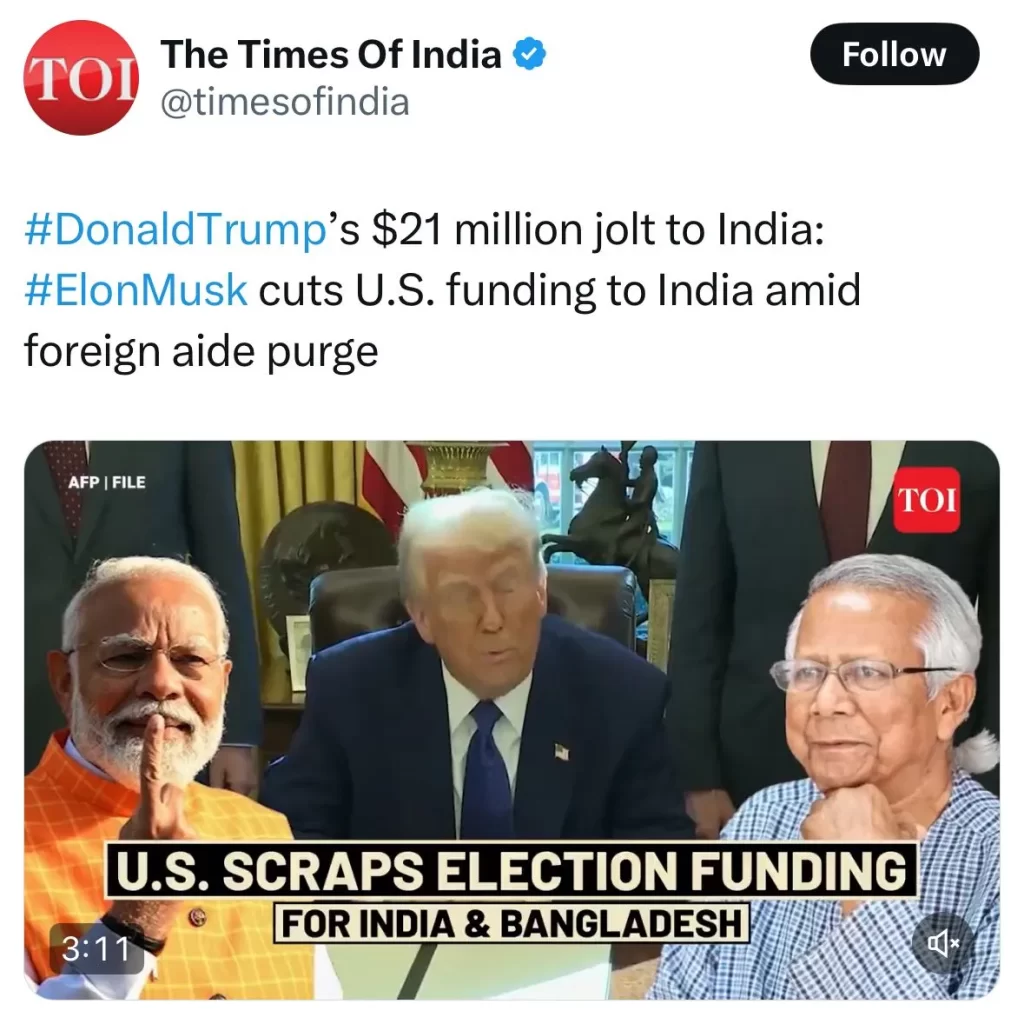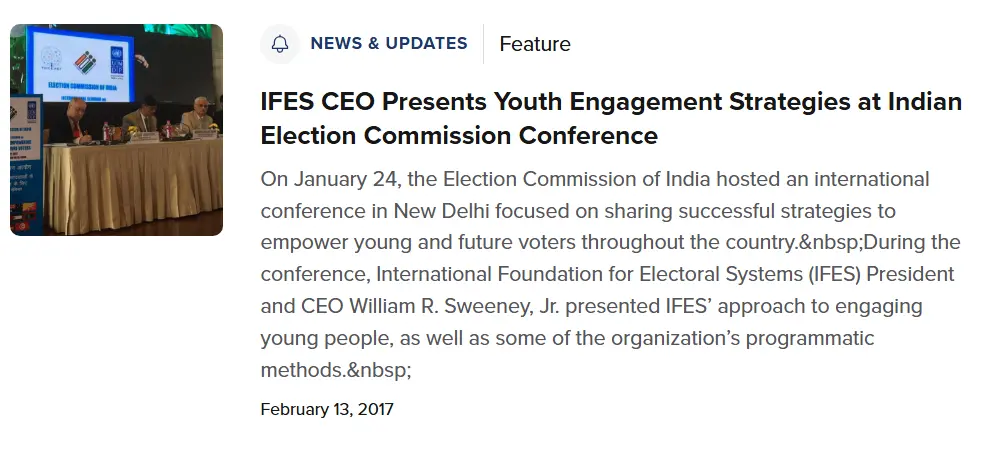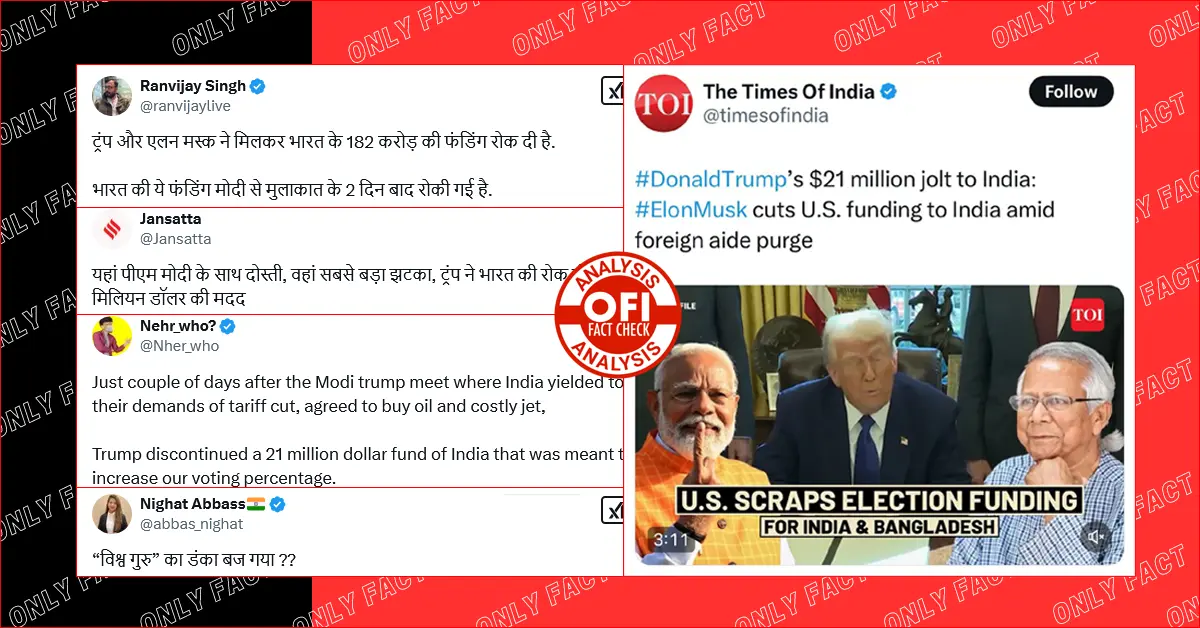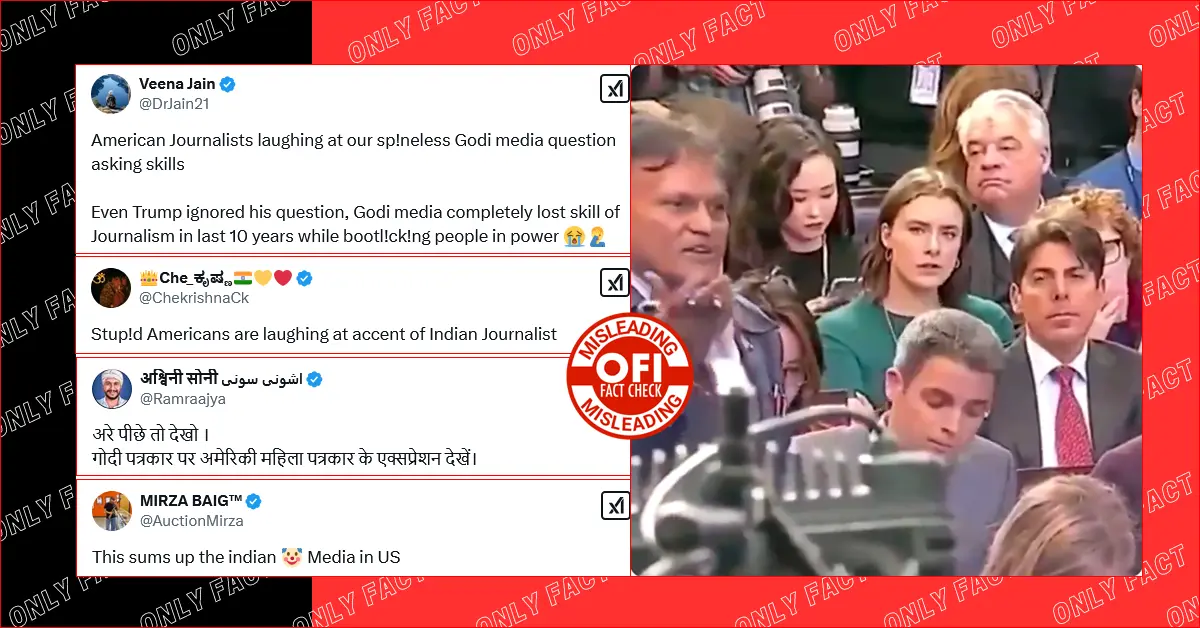Recently, U.S. Department of Government Efficiency (DOGE), led by the world’s richest man, Elon Musk. DOGE announced that it had canceled U.S. funds previously allocated to influence “voter turnout in India.” These funds included $ 21 million for “voter turnout in India,” $29 million for “strengthening the political landscape” in Bangladesh, and $20 million for “fiscal federalism” in Nepal.
This move has disrupted leftist networks, prompting strong reactions. Critics claim that just after Indian Prime Minister Narendra Modi concluded his visit to the United States, the U.S. administration cut $ 21 million in aid intended for India. Left-leaning social media users and mainstream media outlets are now shaping a narrative suggesting that these funds were meant for positive initiatives in India.
The Times of India wrote, ‘DonaldTrump’s $21 million jolt to India: ElonMusk cuts U.S. funding to India amid foreign aide purge.’

Ranvijay Singh claimed, ‘Trump and Elon Musk together have stopped India’s funding of Rs 182 crore. This funding from India has been stopped two days after the meeting with Modi.’
Congress spokesperson Night Abbas stated, ‘The drum of “Vishwa Guru” has sounded??’
“विश्व गुरु” का डंका बज गया ?? https://t.co/YnPJ0EXhVb
— Nighat Abbass🇮🇳 (@abbas_nighat) February 16, 2025
Aajtak, Jansatta, Nehr_who, and News 24 made a similar claim.
Also Read: Edited Image Falsely Shows PM Modi Traveling in a Taxi in France
Analysis
We began our fact-checking process by examining the official DOGE account on X. The post shared by DOGE states: “$486M to the ‘Consortium for Elections and Political Process Strengthening,’ including $22M for ‘inclusive and participatory political process’ in Moldova and $21M for voter turnout in India.”
This indicates that the United States administration allocated $21 million to support “voter turnout” in India through the “Consortium for Elections and Political Process Strengthening” (CEPPS).
US taxpayer dollars were going to be spent on the following items, all which have been cancelled:
— Department of Government Efficiency (@DOGE) February 15, 2025
– $10M for "Mozambique voluntary medical male circumcision"
– $9.7M for UC Berkeley to develop "a cohort of Cambodian youth with enterprise driven skills"
– $2.3M for "strengthening…
Understanding CEPPS
On paper, CEPPS is described as: “A nonprofit organization that brings together the expertise of three leading international institutions—the National Democratic Institute, the International Republican Institute, and the International Foundation for Electoral Systems (IFES)—to support elections and political transitions worldwide. CEPPS collaborates with local, regional, and global partners to build resilient, inclusive, and accountable democracies. Established independently in 1995, CEPPS is funded by the Global Elections and Political Transitions (GEPT) Program at USAID. As a consortium, CEPPS enables USAID and other donors to implement large-scale democracy, rights, and governance (DRG) programs across the world.”
However, further investigation into CEPPS was limited as their website has been taken down.
Examining CEPPS and Its Role
Despite being presented under noble titles, the flag raises regarding its actual operations. According to IFES, a CEPPS partner, “On September 23, 2014, the International Foundation for Electoral Systems (IFES) hosted a discussion between IFES President and CEO Bill Sweeney and former Chief Election Commissioner of India (ECI), S.Y. Quraishi. The discussion centered around Quraishi’s book, An Undocumented Wonder: The Making of the Great Indian Election, which provides a first-hand account of India’s electoral process. Quraishi was also honored with IFES’ prestigious Hutar Award, recognizing his contributions to improving democratic practices.”

Additionally, IFES President and CEO Anthony Banbury travelled to India in October 2022, during the trip from Banbury met with the Electoral Commission of India in New Delhi, India, for their convening of the Democracy Summit’s Electoral Integrity Cohort in New Delhi, India.
Unsurprisingly, former Chief Election Commissioner S.Y. Quraishi has strong affiliations with the left. He frequently appears in left-leaning media, criticizing the Modi government and India’s electoral system. On November 28, 2024, Quraishi expressed skepticism over the Maharashtra State Assembly elections and opposed Modi’s proposal of “One Nation, One Election,” which aims to reduce frequent election expenditures.
Mike Benz’s Allegations on US Interference
Moreover, former U.S. State Department official Mike Benz has alleged that the United States has actively interfered in the domestic politics of multiple nations, including India and Bangladesh. According to Benz, U.S.-backed agencies have used media influence, social media censorship, and funding of opposition groups as tools to shape political outcomes.
Benz claims that elements within the U.S. foreign policy establishment—including USAID, think tanks, and major tech companies—manipulated online discourse during India’s 2019 general elections to undermine Prime Minister Narendra Modi and the BJP. He asserts that these groups worked together to frame Modi’s political success as a product of misinformation, thereby creating a justification for widespread censorship.
Benz further alleges:
• Social Media Manipulation: The U.S. State Department pressured major tech companies such as Facebook, WhatsApp, YouTube, and Twitter to suppress pro-Modi content.
• Targeting WhatsApp: In January 2019, WhatsApp restricted message forwarding in India, which Benz suggests was a deliberate move to limit BJP’s ability to mobilize voters.
• Counter-Misinformation Programs: USAID and U.S.-linked think tanks allegedly financed initiatives under the pretext of combating misinformation, while in reality, their objective was to suppress nationalist movements like the BJP.
• Involvement of Global Think Tanks: Organizations like the Atlantic Council and the Global Engagement Center allegedly influenced social media platforms to moderate content that supported Modi and the BJP.
Benz also claims that this anti-Modi campaign was orchestrated by factions within the U.S. State Department that operated independently of the Trump administration. Despite Trump’s cordial relationship with Modi, bureaucratic elements within the U.S. government, particularly those overseeing cyber policies, were allegedly involved in directing censorship efforts in collaboration with Big Tech.
According to Benz, these activities are part of a broader U.S. strategy that employs digital censorship, media narratives, and civil society funding to manipulate political outcomes globally. If true, this suggests that USAID and other U.S.-backed organizations actively interfered in India’s democratic process by curbing Modi’s influence and amplifying alternative narratives aligned with Washington’s geopolitical interests.
I foretold all of this in a prophecy to India long ago 🔮 https://t.co/oi8dqrZQma pic.twitter.com/9bJx2t7BGK
— Mike Benz (@MikeBenzCyber) February 11, 2025
Additionally, multiple investigative threads on X suggest that around 87 Indian journalists have received training and funding from USAID. These journalists allegedly push anti-government, anti-Modi, and anti-India narratives, aligning with USAID’s broader objectives.
This is very big.
— Vijay Patel (@vijaygajera) February 11, 2025
1. Here is the list of so-called Independent journalists funded by USAID-funded Earth Journalism.
This list has the names of 86 Indians who write articles on their pay roles.
Do you know where their articles are published?
To know read this thread now👇 pic.twitter.com/3v3fz5llh4
Conclusion
Combining the revelations from DOGE’s report, Mike Benz’s testimony, and various investigative findings, it is clear that the Consortium for Elections and Political Process Strengthening collaborated with USAID to train left-leaning journalists and promote an anti-Modi narrative, with the objective of influencing India’s elections against the Bharatiya Janata Party (BJP). This contradicts the claims made by left-leaning social media users and mainstream media, who suggest that the funding was intended as aid for the country.
Also Read: Video of NY Post Journalist Mocking Indian Journalist Shared as Recent








